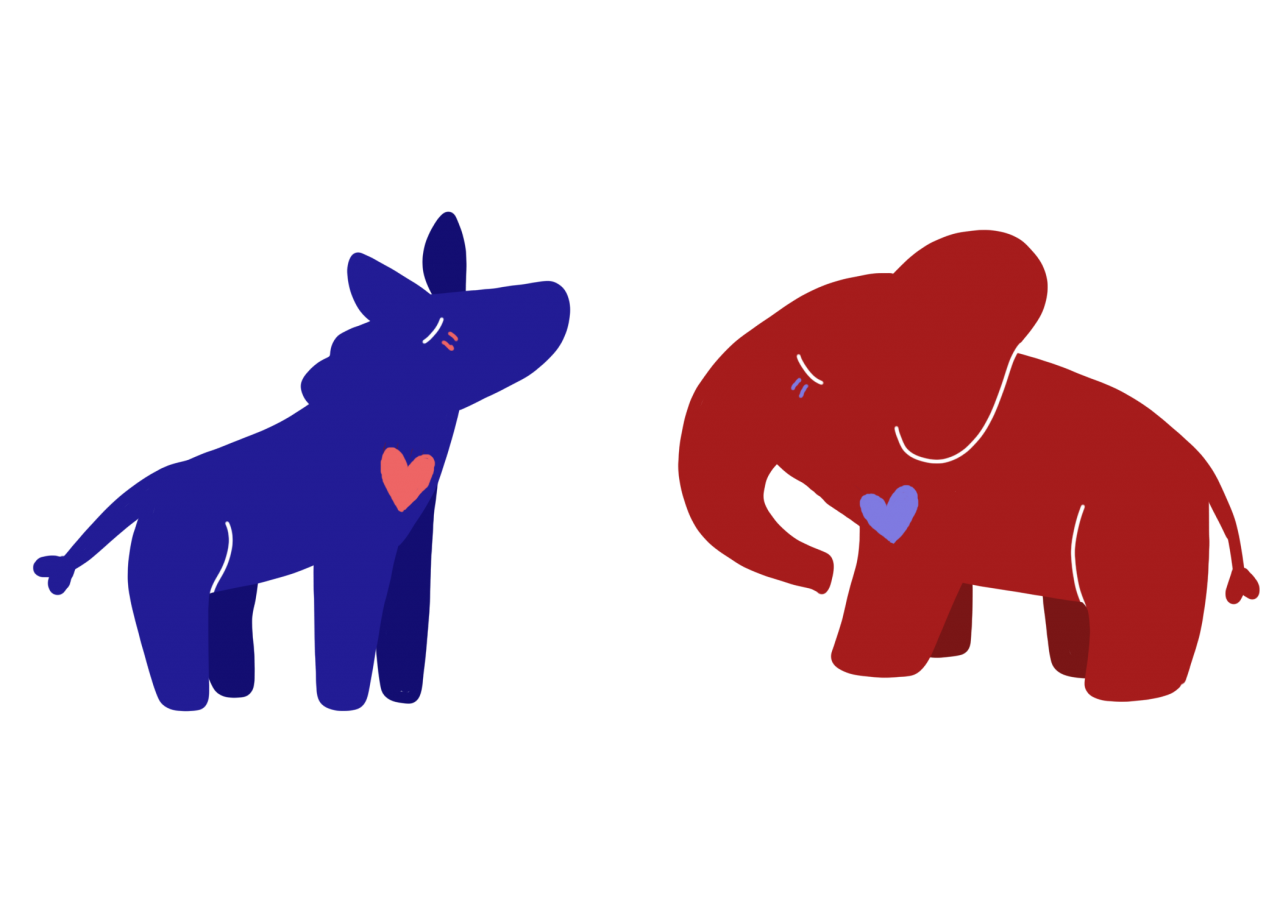Illustration by Ren Rader
Is it bad that I’m dating someone whose views are the complete opposite of mine? We still have the same core values, but I struggle with telling people his political affiliation considering how different mine is. —Brooke
Dear Brooke,
If you are dating someone with views “completely opposite” to yours, it means you don’t completely disagree with his views, and that you’re actually more similar than you think. Here’s what this question is telling me: you’re worried that other people will think you’re enabling his seemingly problematic beliefs, or what others around you would deem problematic, and therefore, your political beliefs would be illegitimatized by revealing the politics of your partner.
There’s often harsh discourse about whether you should date or even befriend someone with differing political views as you. From what I’ve viewed on the internet, it seems those who are more encouraging of this inter-political friendship are right-leaning, while those who discourage it are left-leaning. In 2018, a woman named Lisa L. Kirchner wrote a controversial piece called, “I’m A Liberal Feminist And Next Month I’m Marrying a Trump Supporter.” She begins her article by establishing how liberal she was, even going so far as to put, “NOTE: If you voted for Donald Trump, keep scrolling,” in her dating profile, and she was diagnosed with costochondritis, swelling of the sternum inflicted by anxiety as a result of the election.
She wasn’t seeking to date a Trump supporter, but I guess love works in complicated ways. She acknowledged in her article that had she been a person of color, a queer person or someone with DACA status, that she wouldn’t have been allowed to look past his political beliefs.
Of course, I don’t know who you are, and maybe you are a person of color, a queer person or if you hold DACA status, and you still don’t disagree with his views enough to end the relationship. In that case, then you should reevaluate your own beliefs and realize that they aren’t as cemented as you may portray them to be. Before you begin to think about your relationship, think about what you are okay with, and what would be a dealbreaker. Here’s a question to consider: are you concerned that you’re compromising your own ethics, or are you concerned that others will THINK you’re compromising your ethics? Are those even your ethics?
Some would say there’s a simple answer here: who cares? Love is love, right? It depends on how you view it. In my own relationships, I personally couldn’t date someone who didn’t have similar political views as me. Dating someone who was anti-Black would mean that I was OK with anti-Blackness, and dating someone who was xenophobic would mean that I, whether I wanted to admit it or not, am complicit in xenophobic rhetoric.
If you want to be a real ally to those around you who are marginalized, then you would either help to educate your partner on issues affecting real people or decide that you’re not OK with dating someone who doesn’t have a basic understanding of how systems of oppression work. You could also continue to lie about the degree to which you support marginalized people, but you should know they can often see right through false allyship. Clearly, this matters to you enough to where you felt the need to ask, and I’m glad you did.
When you love someone, you can only hope they love everyone else around you too — or at least to the extent that grants others peace in existing. Loving someone whose politics make you uncomfortable is like watching a film you once loved until you realized the harm it caused. You can sit there and try to dwell in the romantic aspects of it; you can try to ignore all the horrible things you learned about the lead actor, but you’ll sit there with the knowledge of your complicity gnawing away at you. Eat your popcorn, laugh at that joke; it’s never so bad when you’ve locked yourself in a secret room, right?
I hope you allow yourself to live honestly.
Best wishes, Kayla




